The kairos concept is, in a nutshell, that there are seasons in life and in community, so that there are times that are opportune or even simply pivotal and trend-making. At such times, we are forced to decide, for good or ill. And yes, carry on with business as usual . . . especially on a manifest march of folly . . . is a [collective, power-balance driven] decision; ill advised though it may be:

More formally:
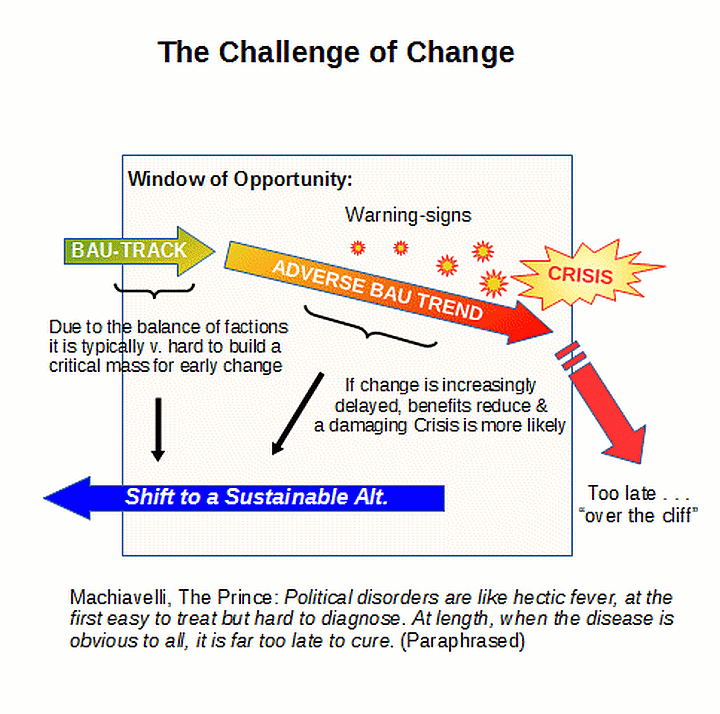
With that in mind, I now draw attention to Chenyuan Snider’s expose of some of the more terrifying Red Guard-like group-guilt, stereotyping and scapegoating tactics of the totalitarian government she grew up under; here, targetting a particularly revered group in historic, Confucius- influenced Chinese culture, teachers. Let me excerpt to highlight the power dynamics at work:

When I was a first grader, there was a new political movement initiated by the Communist Party in China – the anti-teacher movement. It was precipitated by a tragic incident in which a student in China’s remote countryside attempted suicide because of mistreatment by her teacher. Overnight, all teachers in China were considered evil by virtue of being teachers. As students, we were ordered by the authorities to write about our teachers’ unscrupulous behavior towards us. It was mandatory. Every student had to write a condemnation about their own teacher on a poster and paste it on the wall. The bigger the poster and the longer the criticism, the holier the student became. In other words, the more a teacher was vilified, the more righteous the student appeared. There was no time for anyone to process and digest the new situation because it came like a huge wave engulfing everyone. During my time growing up in China, there were several movements during which one group was set up against another. These movements had proven to be enormously effective for the communist government to consolidate power. In the process, enemies were eliminated . . . .
Throughout history, wherever there are humans, there is injustice. However, when events are interpreted not as the fault of individuals, but rather, as a fault of a certain group, it creates hostility between large numbers of people. Through propaganda and political correctness one group can claim ascendant status over another. But this does not resolve the issues. In reality, tension from both sides continues to build up and intensify, which in turn produces more injustice and opposition. The justice that is due to the true victim is often buried in the larger struggle between groups. In the end, the victim is used as a prop serving the purpose of fighting the opposition.
This is of course reflective of the common folly of projecting blame or disdain to race, class, age [or want of age], sex, profession, honest occupation or the like. Surely, we can agree with the apostles and prophets that we partake of the common grace of life, sharing a common Imago Dei.
However, as a civilisation, we now face a recrudescence of one of the worst plagues afflicting our civilisation over the past quarter-millennium, [neo-]Marxism. Here, in a plethora of manifestations of so-called Critical Theories, more accurately: cultural form, mutant Marxism.
Let’s excerpt SEP, to see a self-congratulatory, programmatic self-description (on the way to urgently needed critique):
“Critical Theory” in the narrow sense designates several generations of German philosophers and social theorists in the Western European Marxist tradition known as the Frankfurt School. According to these theorists, a “critical” theory may be distinguished from a “traditional” theory according to a specific practical purpose: a theory is critical to the extent that it seeks human “emancipation from slavery”, acts as a “liberating … influence”, and works “to create a world which satisfies the needs and powers” of human beings (Horkheimer 1972, 246). Because such theories aim to explain and transform all the circumstances that enslave human beings, many “critical theories” in the broader sense have been developed. They have emerged in connection with the many social movements that identify varied dimensions of the domination of human beings in modern societies. In both the broad and the narrow senses, however, a critical theory provides the descriptive and normative bases for social inquiry aimed at decreasing domination and increasing freedom in all their forms.
Critical Theory in the narrow sense has had many different aspects and quite distinct historical phases that cross several generations, from the effective start of the Institute for Social Research in the years 1929–1930, which saw the arrival of the Frankfurt School philosophers and an inaugural lecture by Horkheimer, to the present. Its distinctiveness as a philosophical approach that extends to ethics, political philosophy, and the philosophy of history is most apparent when considered in light of the history of the philosophy of the social sciences. Critical Theorists have long sought to distinguish their aims, methods, theories, and forms of explanation from standard understandings in both the natural and the social sciences. Instead, they have claimed that social inquiry ought to combine rather than separate the poles of philosophy and the social sciences: explanation and understanding, structure and agency, regularity and normativity. Such an approach, Critical Theorists argue, permits their enterprise to be practical in a distinctively moral (rather than instrumental) sense. They do not merely seek to provide the means to achieve some independent goal, but rather (as in Horkheimer’s famous definition mentioned above) seek “human emancipation” in circumstances of domination and oppression. This normative task cannot be accomplished apart from the interplay between philosophy and social science through interdisciplinary empirical social research (Horkheimer 1993). While Critical Theory is often thought of narrowly as referring to the Frankfurt School that begins with Horkheimer and Adorno and stretches to Marcuse and Habermas, any philosophical approach with similar practical aims could be called a “critical theory,” including feminism, critical race theory, and some forms of post-colonial criticism . . . .
It follows from Horkheimer’s definition that a critical theory is adequate only if it meets three criteria: it must be explanatory, practical, and normative, all at the same time. That is, it must explain what is wrong with current social reality, identify the actors to change it, and provide both clear norms for criticism and achievable practical goals for social transformation.
That ever so humble but sometimes inadvertently revealing crowd-source, Wikipedia, gives somewhat less subtly shielded details:
Critical theory is the reflective assessment and critique of society and culture to reveal and challenge power structures. It argues that social problems are influenced and created more by societal structures and cultural assumptions than by individual and psychological factors. Critical theory has origins in sociology and also in literary criticism. The sociologist Max Horkheimer described a theory as critical insofar as it seeks “to liberate human beings from the circumstances that enslave them”.[1]
In sociology and political philosophy, the term Critical Theory describes the Western Marxist philosophy of the Frankfurt School, which was developed in Germany in the 1930s. This use of the term requires proper noun capitalization,[citation needed] whereas “a critical theory” or “a critical social theory” may have similar elements of thought, but does not stress the intellectual lineage specific to the Frankfurt School. Frankfurt School critical theorists drew on the critical methods of Karl Marx and Sigmund Freud. Critical theory maintains that ideology is the principal obstacle to human liberation.[2] Critical theory was established as a school of thought primarily by the Frankfurt School theoreticians Herbert Marcuse, Theodor Adorno, Max Horkheimer, Walter Benjamin, and Erich Fromm. Modern critical theory has additionally been influenced by György Lukács and Antonio Gramsci, as well as the second generation Frankfurt School scholars, notably Jürgen Habermas. In Habermas’s work, critical theory transcended its theoretical roots in German idealism and progressed closer to American pragmatism. Concern for social “base and superstructure” is one of the remaining Marxist philosophical concepts in much of contemporary critical theory.[3]
Postmodern [–> thus, current] critical theory analyzes the fragmentation of cultural identities in order to challenge modernist era constructs such as metanarratives, rationality and universal truths, while politicizing social problems “by situating them in historical and cultural contexts, to implicate themselves in the process of collecting and analyzing data, and to relativize their findings”.[4]
Ironically, the “metanarrative” of Western, white male domination and the heroic effort to overthrow it is, of course, an obvious self-referentially incoherent element in all this. And, as we saw from Ms Snider, once sociopathic radical ideologues use this metanarrative to target those whom they wish to turn into scapegoats, the door yawns to group guilt on core characteristics that are genetic or so shaped by one’s life story as to be key to one’s identity, leading to terrifying injustice through agit prop, media amplification of street theatre, media lynch mobs, lawfare, show trials and oh so convenient “progressive” solutions.
If such does not ring true, it should.
Now, several years ago, here at UD, I put on the table an alternative framework for political spectra, informed by historical trends and linked factors on modern liberty and constitutional, democratic self-government through elected representatives:

It seems to me, that this is a useful framework to speak to some ugly trends of our time that are not without relevance to the marginalising, stereotyping, slandering, expelling and scapegoating of supporters of Intelligent Design. But then, it — more significantly — speaks far more broadly.
The natural state of humanity is tyranny, or at most some degree of lawfulness under a somewhat fair-minded governing elite. The antithesis to that is the raw, untamed wilderness, the “dark and bloody ground” of the so-called state of nature. That description, is how Kentucky (then a mutually agreed hunting grounds of the tribes) was described to one Daniel Boone, by Amerindians. Such a state is so abhorrent, so prone to naked theft, murder and rapine, that it is a repeller-pole that drives communities towards the vortex of tyranny. From which, historically, as a rule one only escapes by rivers of blood and tears.
In my considered opinion, it was only as the rise of moveable-type print coupled to a religious ferment emphasising freedom of conscience and individual accountability before God, that the unstable but sustainable middle ground emerged. Between 1450 and 1650, the groundwork for democratising reforms with due buttressing from key community institutions enabled the rise of modern, elected representative, parliamentary democracy constrained not only by a tradition-bound corpus of law, but by explicit Constitutions pivoting crucially on Bills of Rights articulated on built-in, conscience attested principles of natural law. I should add, interestingly, all of these happened in lands that acceded to Christian Civilisation and which had a significantly Germanic cultural base with its emphasis on freedom, thus consent to legitimate rule.
Where, let us recall, some core theses:
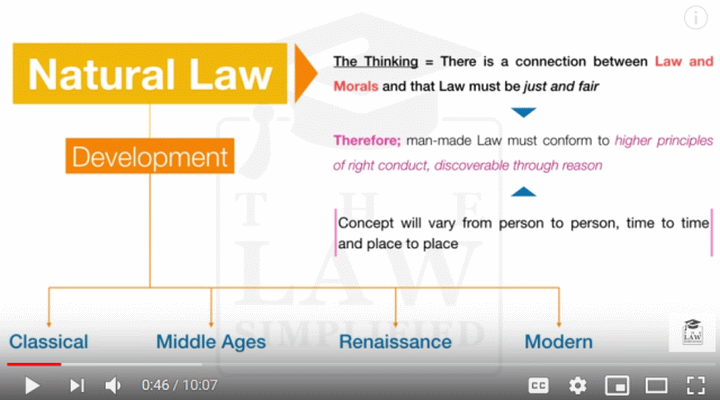
Thus, as we see in Augustine’s and Aquinas’ reflections:
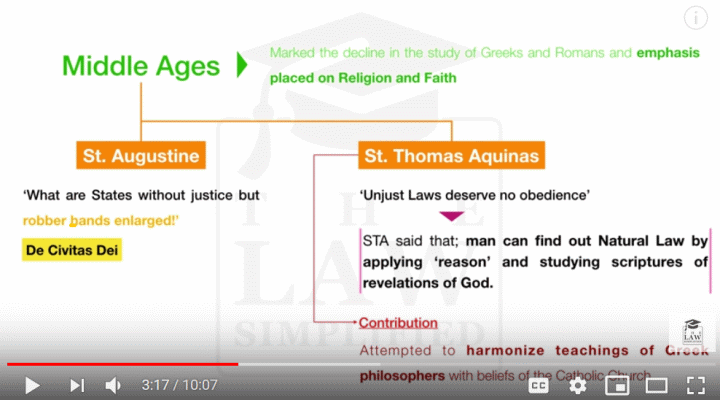
Where, we may see Aquinas’ theme of a naturally evident, intelligible (so, sound conscience attested), creation-order based framework for civil law and for reformation:

We still hear an echo of this in the concept of crimes that shock the conscience. Such crimes can be done by some brigand hiding in a cave, but they can also be done by those in positions of lawful power or even some who pose as liberators. Crimes can even be done under false colours of law or rights and even that of processes of justice, through lawfare.
In my considered view, the ongoing abortion holocaust of our living posterity in the womb . . . 800+ millions in 40+ years and mounting up by another better part of a million per week [statistics suggests 1.4 billion] . . . is a capital, utterly civilisation corrupting example.
Litmus Test: if one cannot pass the test of standing up for the unborn, further claims to be a champion of liberation of the oppressed can be disregarded.
However, in our day, the toxic brew we face is compounded by a widespread rejection of the natural law vision with its pivot on sound conscience sensitive to truth, duty, justice. I here point to legal positivism and the nihilism that crouches at the door.
Again, SEP is subtly veiled, but enough sticks out that we can pick up hints as to the lurking reefs of a graveyard of ships of state:
Legal positivism is the thesis that the existence and content of law depends on social facts and not on its merits. The English jurist John Austin (1790–1859) formulated it thus:
>>The existence of law is one thing; its merit and demerit another. Whether it be or be not is one enquiry; whether it be or be not conformable to an assumed standard, is a different enquiry. (1832 [1995: 157]) >>
The positivist thesis does not say that law’s merits are unintelligible, unimportant, or peripheral to the philosophy of law. It says that they do not determine whether laws or legal systems exist. Whether a society has a legal system depends on the presence of certain structures of governance, not on the extent to which it satisfies ideals of justice, democracy, or the rule of law. What laws are in force in that system depends on what social standards its officials recognize as authoritative; for example, legislative enactments, judicial decisions, or social customs. The fact that a policy would be just, wise, efficient, or prudent is never sufficient reason for thinking that it is actually the law, and the fact that it is unjust, unwise, inefficient or imprudent is never sufficient reason for doubting it. According to positivism, law is a matter of what has been posited (ordered, decided, practiced, tolerated, etc.). Austin thought the thesis “simple and glaring”. While it is probably the dominant view among analytically inclined philosophers of law, it is also the subject of competing interpretations together with persistent criticisms and misunderstandings.
Wikipedia is again inadvertently more frank and tellingly revealing:
Legal positivism is a school of thought of analytical jurisprudence developed largely by legal philosophers during the 18th and 19th centuries, such as Jeremy Bentham and John Austin. While Bentham and Austin developed legal positivist theory, empiricism provided the theoretical basis for such developments to occur. The most prominent legal positivist writer in English has been H. L. A. Hart, who, in 1958, found common usages of “positivism” as applied to law to include the contentions that:
— laws are commands of human beings;
— there is not any necessary relation between law and morality, that is, between law as it is and as it ought to be;
— analysis (or study of the meaning) of legal concepts is worthwhile and is to be distinguished from history or sociology of law, as well as from criticism or appraisal of law, for example with regard to its moral value or to its social aims or functions;
— a legal system is a closed, logical system in which correct decisions can be deduced from predetermined legal rules without reference to social considerations;
— moral judgments, unlike statements of fact, cannot be established or defended by rational argument, evidence, or proof (“noncognitivism” in ethics).[1]
Historically, legal positivism is in opposition to natural law’s theories of jurisprudence, with particular disagreement surrounding the natural lawyer’s claim that there is a necessary connection between law and morality.
Got that? As in, “moral judgments, unlike statements of fact, cannot be established or defended by rational argument, evidence, or proof.”
Thus, then, “legal positivism is in opposition to natural law’s theories of jurisprudence, with particular disagreement surrounding the natural lawyer’s claim that there is a necessary connection between law and morality.”
Morality and justice, having been banished to the realms of irrationality, law is severed from the premise of morality, thus, justice. Nihilism — raw, untrammelled will to power (tempered only by cunning calculation as to what one can get away with, or cannot YET get away with) crouches at the door.
Enter, stage left, the sociopath with power or hoping to gain power; even under the guise of righting grave wrongs and liberating the oppressed. (And we need not detain ourselves on cheap agit prop stunts of turnabout projection as to who is oppressor. All polities are prone to injustices, the issue is to keep open a path to sound reformation.)
Destination, tyranny and the ruinous march of angry fools following a demonically anointed false political messiah:

Reformation is indicated, in defence of our civilisation.
As a start-point, we must recognise certain inescapable first principles and duties of reason that not only pervade but actually govern all of our rationality. Pace the legal positivists, morality is central to rationality and is itself rational, pivoting on self-evident first principles.
How can we — in an age blighted by selective hyperskepticism sitting in the seat of proper prudence — have confidence in such?
Simple, the very one who objects to such principles, inevitably, inescapably, implicitly, ALWAYS appeals to our intuitive adherence to such first duties of reason. So, we may freely hold that what is inescapably bound up in our rational life is just as inescapably, manifestly, necessarily, self-evidently true.
Where, of course, I here speak of our inescapable first duties of reason: to truth, to right reason, to prudence, to neighbour, so also to fairness and justice, etc.
Epictetus gives us a classic demonstration in a nutshell:
How is logic necessary?
When someone in [Epictetus’] audience said, Convince me that logic is necessary, he answered: Do you wish me to demonstrate this to you?—Yes.—Well, then, must I use a demonstrative argument?—And when the questioner had agreed to that, Epictetus asked him. How, then, will you know if I impose upon you?—As the man had no answer to give, Epictetus said: Do you see how you yourself admit that all this instruction is necessary, if, without it, you cannot so much as know whether it is necessary or not? [Cf J. C. Wright]
Let the legal positivist or critical theorist object rationally and responsibly without implicitly relying on such, if he can: _______ . We confidently, freely hold that he cannot do so.
On this, we may go down the line of asking what sort of reality root must obtain, in a world of such rationally, morally governed creatures. There is no serious answer to that, but that that root is the inherently good, utterly wise source of worlds. A familiar figure, but we need not explore that side, other than to note that the rise of both so called legal positivism and cultural marxism trace to the rise of atheism as a mass movement. First, among intellectual classes then more widely as ideologies dressed up in lab coats took root and seized cultural high ground.
That is significant, as it implies that needed reform has to challenge such intellectual roots and correct such ideologies. Which brings us to the general relevance of a useful but sometimes controversial mapping exercise:
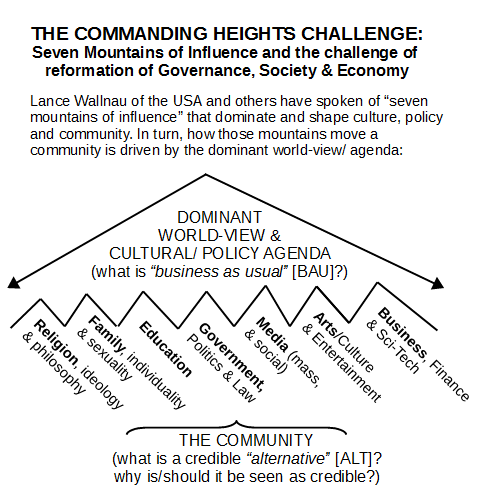
You tell me that this model — originally tracing to the circle, Bill Bright, Loren Cunningham and Francis Schaeffer 40+ years past — does not capture a good slice of the issue. I think, we can freely use it as a map . . . which is not the territory but if well made, a helpful guide to it. (I suggest, using it in two modes: one, as a map of high ground dominating community life with seven metaphorical hills to match the famous seven hills of Rome; two, as a temple with seven columns that support and are in turn protected by a common roof.)
So, we can clearly see elements of the witches’ brew and storm that has begun to break across our civilisation in this, The Year of Our Lord, 2020, MMXX.
We have to challenge worldviews and cultural agendas, exposing Overton Window power games:
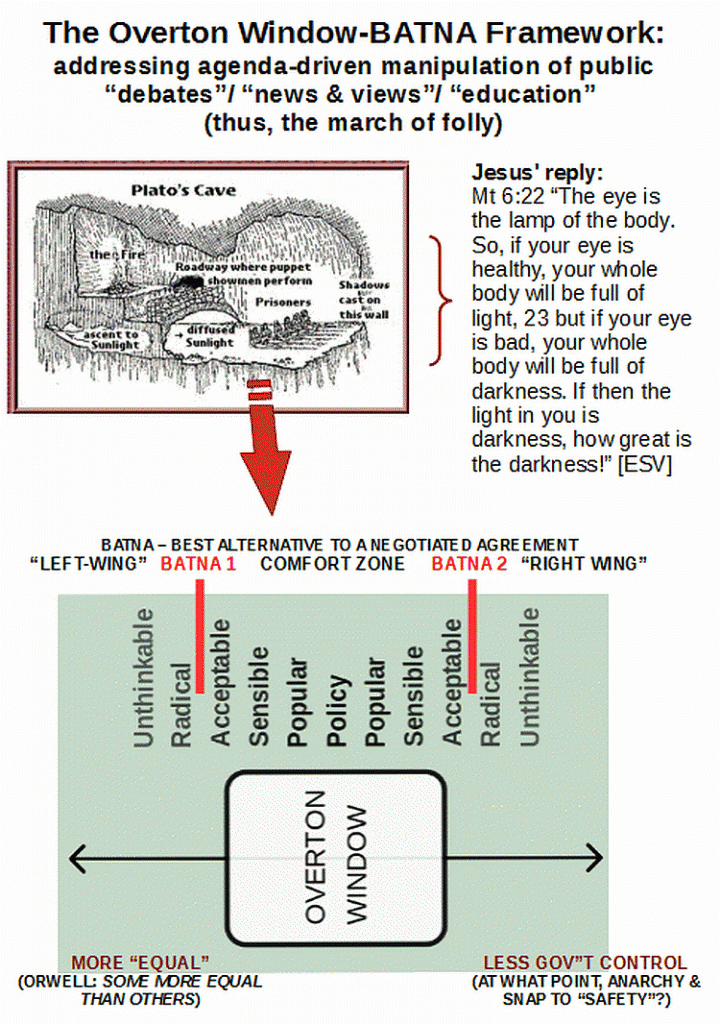
(Who would have thought that significant voices in a leading power in our day, would irresponsibly call for “defunding the police” in the context of a case where one officer . . . on evidence, likely for good reason . . . faces Murder 1 charges and three juniors face only slightly lesser charges? That, shocks both mind and conscience. Yes, reform the police is always a legitimate issue, defunding them would only trigger snap-back to the vortex of tyranny. If you needed evidence of a fourth generation, agit prop, media manipulation and lawfare driven, so far low kinetic civil war in that power, there it is. A voyage of folly is ruinous as the ghosts of Socrates, Plato and even Alcibiades would jointly warn.)
However, the issue is far wider and deeper than current political and police follies. Reformation is what is needed, and that has to engage worldviews roots. Such as, turtles all the way down being impossible:

Let us consider how we get to worldview root level, first plausible framework faith points:

In this context, rebalancing how we consume mass and nowadays social media will be necessary also — as one of our very first steps:
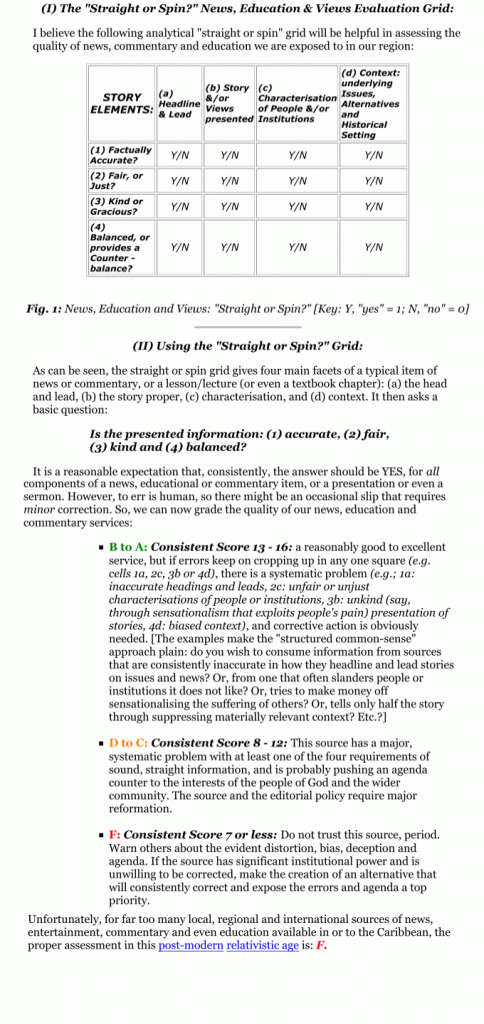
Similarly, it is clear that cultural marxism and legal positivism cannot make the grade. So, it is time for serious re-thinking towards sound reformation. Otherwise, shipwreck. END
PS: Notice how street protesters in DC added to the BLM street slogan put up by the Mayor:

In broad daylight:

The platform:

PPS: Warlordism and “protection” demands emerge in Seattle WA, USA — anarchy is a repeller pole that tends to push communities to the vortex of tyranny:

PPPS: The monument to fallen police officers that was recently vandalised:

And, after repeated vandalisation this is the statue of the man who warned against appeasing Herr Schicklegruber and Co. then led Britain’s lonely stand with backs to the wall in 1940. Yes, Sir Winston Spencer Churchill, in London:
